ISO 527 Mechanical Reactivity Testing of Plastics
The ISO 527 mechanical reactivity testing standard is a crucial tool in the quality assurance and research & development (R&D) processes for plastics. This standardized test evaluates how different types of plastics react to various mechanical stresses, providing essential data on the material's durability, toughness, and reliability under stress conditions.
The ISO 527 series encompasses several tests that assess the mechanical properties of plastics in different ways. These include tensile testing (ISO 527-1), flexural testing (ISO 527-2), impact testing (ISO 527-3), and hardness testing (ISO 527-4). Each test provides insights into how a plastic specimen will behave under mechanical stress, which is critical for applications ranging from automotive components to consumer goods.
The standard specifies precise procedures for preparing specimens, conducting tests, and interpreting results. Specimens are typically cut according to the dimensions outlined in ISO 527, ensuring that the test conditions remain consistent across different laboratories. This consistency is paramount for comparative studies and compliance with international standards.
During testing, a specimen of plastic undergoes mechanical deformation until it fails or reaches a specified stress point. The key parameters measured include tensile strength, flexural modulus, impact resistance, and hardness. These properties are essential for understanding how a material will perform in real-world applications where mechanical forces are present.
The ISO 527 standards are widely accepted across the globe due to their robustness and accuracy. They provide a reliable framework for quality assurance and R&D activities, ensuring that materials meet stringent performance criteria before being used in manufacturing processes.
For quality managers and compliance officers, ISO 527 testing is indispensable in maintaining product integrity and meeting regulatory requirements. In the realm of R&D, this standard allows engineers to explore new formulations and designs with confidence, knowing that they can rely on consistent test results.
The mechanical reactivity tests also play a vital role in procurement processes, ensuring that suppliers deliver materials that meet specific performance benchmarks. By using ISO 527 testing, organizations can ensure that the plastic components they source are reliable and suitable for their intended applications.
Applied Standards
The ISO 527 series of standards is a cornerstone in the field of polymer testing. These internationally recognized standards provide clear guidelines on how to test the mechanical properties of plastics, ensuring that results are consistent and reliable across different laboratories.
- ISO 527-1: Tensile Testing: This standard specifies methods for tensile testing of plastics. It covers specimen preparation, testing parameters, and data analysis to determine the tensile strength and modulus of elasticity of plastic specimens.
- ISO 527-2: Flexural Testing: This part of ISO 527 provides specifications for flexural testing, which evaluates a material's ability to withstand bending forces. It includes details on specimen preparation, test setup, and data interpretation.
- ISO 527-3: Impact Testing: This standard outlines procedures for impact testing of plastics, focusing on how materials respond to sudden mechanical impacts. The results provide critical insights into the toughness and resilience of a plastic material.
The use of these standards ensures that all tests are conducted under controlled conditions, leading to consistent and reproducible results. This consistency is essential for quality assurance and research activities in the plastics industry.
International Acceptance and Recognition
- Australia: ISO 527 standards are widely accepted across various industries, including automotive, consumer goods, and construction. Compliance with these standards is often a prerequisite for market entry.
- Canada: The Canadian Standards Association (CSA) recognizes ISO 527 as a key standard in materials testing, ensuring that plastic components meet stringent performance criteria.
- European Union: EU regulations frequently reference ISO 527 standards to ensure that plastics used in products comply with environmental and safety requirements. Many countries within the EU have adopted these standards for their national standards.
- New Zealand: New Zealand's Standards NZ recognizes ISO 527 as a benchmark for plastic testing, aligning with international best practices.
- United Kingdom: The British Standards Institution (BSI) incorporates ISO 527 into its national standards, ensuring that UK industries adhere to internationally recognized benchmarks.
The widespread acceptance of ISO 527 in these and other regions underscores its importance in the global plastics industry. Laboratories that comply with these standards are able to generate results that are universally accepted and respected.
Environmental and Sustainability Contributions
- Eco-friendly Materials: By ensuring that plastics meet ISO 527 standards, manufacturers can develop materials that are more durable and less prone to failure under mechanical stress. This leads to longer-lasting products with reduced waste.
- Energy Efficiency: Testing according to these standards helps identify materials that require fewer resources during production, reducing the overall environmental impact of manufacturing processes.
- Recycling Potential: ISO 527 testing can also inform the design of plastics that are more recyclable and easier to process at the end of their life cycle. This contributes to a circular economy by promoting sustainable resource use.
The focus on sustainability in the plastics industry is growing, and ISO 527 plays a key role in this shift. By ensuring that materials are robust yet environmentally friendly, this standard helps drive innovation towards more sustainable practices.





